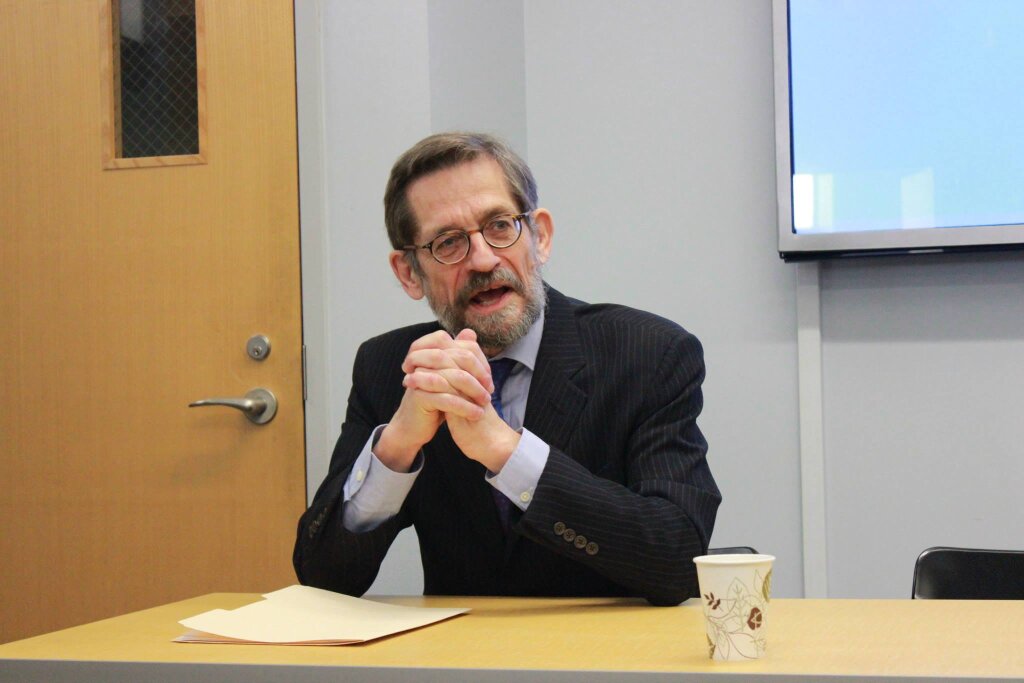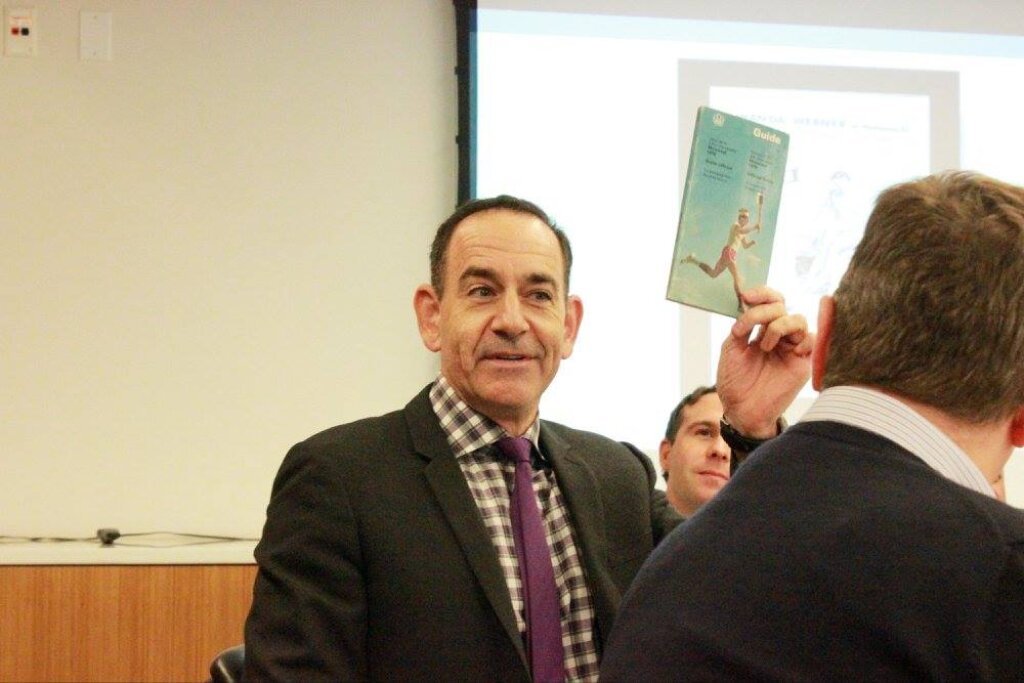Watch the video of the event here
On April 1, 2015, the NYU Jordan Center for the Advanced Study of Russia welcomed Thomas Graham, managing director at Kissinger Associates, for a lecture titled “Rethinking US-Russian Relations.” During a brief introduction, Jordan Center Director Yanni Kotsonis described Graham, who has previously served as a Special Assistant to the President during the administration of George W. Bush, as “one of the sounder minds when it comes to Russian issues.”
Graham started his talk by saying that “that April 1 is never a great day to talk about U.S.-Russian relations.” On this day in 1993 in Annapolis then U.S. President Bill Clinton expressed his commitment to a “strategic alliance with Russian reform,” while in 2009 in London U.S. President Obama and then Russian President Dmitri Medvedev issued a joint statement establishing a “substantive agenda” for collaboration. Unfortunately, all those projects appeared to have failed.
According to Graham, the Ukrainian crisis marks a new era in U.S.-Russian relations, with no hopes for a strategic partnership in sight. He noted, however, that the problems in the relationship between the two countries have deeper causes than the countries’ opposition over Ukraine. To face the current challenges, Graham believes it necessary to take into account the current situation in Russia. “What we need is a new approach for a new era,” he said. Graham proceeded to make five points useful to make sense of today’s Russia.
Graham’s first point illustrated how the demonization of Russian President Vladimir Putin has prevented many from seeing how Russia’s policies reflect longer-term traditions and issues in Russian affairs. Putin, like his predecessors, belongs to the “great power school of international relations” and believes that Russia needs to be a great power in order to survive. Graham argued that any successor to Putin is going to pursue similar policies, with “a change in style but not in substance.”
Moving on to his second point, Graham stated that the “Russia problem” emerged at the end of the French Revolution. In the 19th century, While elsewhere in Europe individual freedom advanced as the foundation of national political systems, Russia remained an absolute autocracy in the 19th century. Yet, the country maintained its essential position in the European balance of power system. Negotiating a vision of Europe and Russia as essentially bound together and yet inextricably different has remained a feature of their relations to the present day, particularly in terms of security.
Graham’s third point focused on the importance of understanding how Russia conceptualizes its own security. Russia’s concerns are tied to the large expanse of its lands and the weakness of its borders, which leaves it often exposed to the enemy. Mongols, Crimean Tatars, Napoleon and Hitler all easily succeeded in penetrating its territory. For this reason, Russia has focused on outward expansion as an “imperative of strategic depth,” only stopping when faced with powerful opposing states. The assumption that if a country falls out of Russia’s zone of influence zone will automatically join the zone of influence of another great power (such as Europe and the U.S.) should also be challenged, Graham said. Russian expansion, moreover, should not be seen as an expression of imperialism (in this sense, the Soviet Union is an anomaly), but as an effort to reassert control over its lost Soviet space, with no desire of going beyond those borders.
In his fourth point, Graham pointed at Russia’s awareness that it would not be able to be an equal partner to a united Europe. This explains its effort towards eroding the potential for integration in the region: Russia is able to compare itself to individual European countries, but not with a compact union.
Among all the continuities highlighted, Graham’s fifth point stressed “one huge discontinuity”: Russia is no longer the dynamic core of Eurasia. “The greater truth is that for the first time in the modern period, Russia beyond its geopolitical space is surrounded by states and regions all of which are more dynamic than Russia is,” he said. From China to the Islamist movement, new actors have appeared on the scene. According to Graham, under the current stagnating economic conditions, Russia is unlikely to regain its energy.
Subsequently, he moved on to discuss how today’s Russia represents a “manageable challenge” for the U.S. as a declining revisionist power. Graham suggested that to deal with this challenge Europe and the U.S. should first fix their domestic socio-economic and political problems first, in order to regain self-confidence and respect abroad.
Graham did not entirely dismiss the need for a military approach, but called for a more efficient allocation of spending and coordination with Europe. “I think it would be a big mistake to think that we need to spend a tremendous amount of money on military and defense purposes,” he said. Competent states and successful economies, history teaches, prove much more effective in stopping an aggressive Russia. In this respect, Ukraine is a top priority. The country will need to tame corruption, build an effective state, forge national consensus and repair its economy – something that, in Graham’s opinion, cannot be achieved while there is civil war in the country. He believes that the U.S. and Europe should be concentrating their efforts in building a durable ceasefire.
Graham also supported the need to levy sanctions, but in a moderate and careful fashion. Weakening Russia’s economy could go against U.S.’s long-term strategic interests, potentially fuelling anti-liberal and anti-democratic turns. Moreover, China, a strategic competitor of the U.S., could take advantage of the weakening of Russia. Most importantly, the sanctions have not proved successful in changing Russia’s behavior in Ukraine.
Graham stated that, if the U.S. wishes to achieve the goal of building a successful state of Ukraine, it will have to accommodate Russia, despite skepticism in Washington. “It’s simply too important of a power for it to be otherwise,” he said. Graham went back to history to show that this approach can prove successful, as it was in the context of the European great power diplomacy in the relatively peaceful 18th and 19th century. “It’s this type of diplomacy that we need to pursue in the next several years,” he concluded.
In the final part of the lecture, Graham answered questions from the audience on a variety of issues, touching upon the power of elites in the post-Soviet space, the militarization of the Baltics and Russia’s place in the BRICS. He also discussed the moral issues behind waging criticism against Russian exceptionalism vis-à-vis notions of American exceptionalism.



